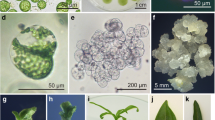Abstract
Single-cell derived sibling lines of `Anliucheng' sweet orange (Citrus sinensis (L.) Osbeck) were established with low-density protoplast culture. Cell densities of 1 to 5×104 cell?ċml−1 were appropriate for this purpose, while a super-low cell density of 5×103 cellċml−1 made most protoplasts destined for programmed cell death (PCD) characterized by multi-nucleation and the formation of apoptotic bodies. These single-cell derived sibling lines were then used as an experimental system for genetic assessment. Cytological examination revealed that chromosome number variation arose spontaneously in the colony per se but not from pre-existing variation. Chromosome number variations continued after one year of subculture at 1-month intervals. However, the ploidy level of these cell lines remained relatively stable during the culture period. In addition, these chromosome number variations were selected against during plant regeneration process.
Similar content being viewed by others

References
Ashmore SE (1997) Status report on the development and application of in vitro techniques for the conservation and use of plant genetic resources. International Plant Genetic Resources Institute, Rome
Brown PTH, Kyozuka J, Sukekiyo Y, Kimura Y, Shicamoto K & Lorz H (1990) Molecular changes in protoplast-derived rice plants. Mol. Gen. Genet. 223: 324-328
Engelmann F (1997) In vitro conservation methods. In: Callow JA, Ford-Lloyd BV & Newbury HJ (eds) Biotechnology and Plant Genetic Resources (pp 119-161). CABI, Oxon
Grosser JW & Gmitter FG Jr (1990) Protoplast fusion and citrus improvement. Plant Breed Rev. 8: 339-374
Guo W-W, Deng X-X & Shi Y-Z (1998) Optimization of electrofusion parameters and interspecific somatic hybrid regeneration in Citrus. Acta Bot. Sin. 40: 417-424
Hao Y-J (2000) In vitro conservation and genetic variation of important fruit trees, Ph.D thesis, Huazhong Agricultural University, Wuhan, PR, China
Hao Y-J, You C-X & Deng X-X (2002) Cell size as a morphological marker to calculate mitotic index and ploidy level of citrus callus. Plant Cell Rep. 20: 1123-1127
Huo H-Q, Hao Y-J & Deng X-X (1999) Induction of embryogenic callus of loose skin mandarins. Acta Biol. Exp. Sin. 32: 289-295
Liu J-H & Deng X-X (2000) Production of tetraploid intergeneric somatic hybrid plants. China Agri. Sci. 33: 98-100
McCabe PF, Levine A, Meijer PH, Tapon NA & Pennell RI (1997) A programmed cell death pathway activated in carrot cells cultured at low cell density. Plant J. 12: 267-280
Murashige T & Tucker DPH (1969) Growth factor requirements of citrus tissue culture. Proc. 1st Int. Citrus Symp. 3: 1155-1161
Nomura K & Komamine A (1985) Identification and isolation of single cells that produce somatic embryos at a high frequency in a carrot suspension culture. Plant Physiol. 79: 988-991
Peschke VM & Phillips RL (1992) Genetic implication of soma-clonal variation in plants. Adv Genet. 30: 41-75
Schnabl H, Mahaworasilpa TL, Coster HGL & van Keller A (1999) Production of hybrid cells from single protoplasts of sunflower hypocotyls and broad bean guard cells by electrical fusion. Plant Cell Tiss. Org. Cult. 55: 59-62
Yan C (1992) Handbook of plant cell cultures (pp 3-59). Agricultural Press, Beijing
Author information
Authors and Affiliations
Corresponding author
Rights and permissions
About this article
Cite this article
Hao, YJ., Deng, XX. Single-cell-derived sibling lines are established as an experimental system to assess chromosome number variations in embryogenic callus cultures of sweet orange. Plant Cell, Tissue and Organ Culture 73, 275–280 (2003). https://doi.org/10.1023/A:1023034921642
Issue Date:
DOI: https://doi.org/10.1023/A:1023034921642



